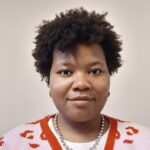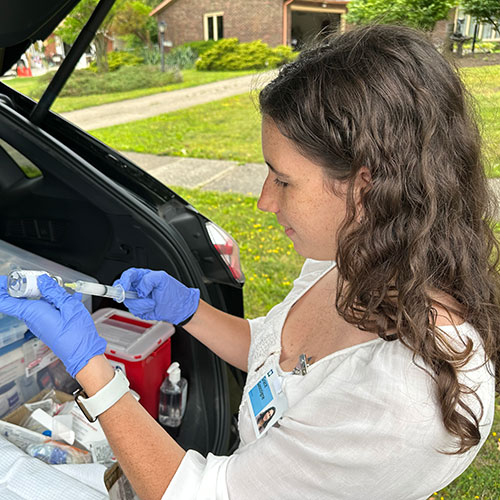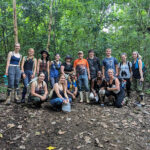
Biochemistry and molecular biology major provides patient care during APEX fellowship

Grace Gascoigne â24, a biochemistry and molecular biology major at the College of ¿Û¿ÛŽ«Ãœ, spent her summer providing care to patients both in the office and in their homes. Under the mentorship of Paul L. Edmiston, professor of chemistry; biochemistry and molecular biology, Gascoigneâs APEX Fellowship provided her the opportunity to gain field experience with a variety of patients and to observe visits and procedures conducted by medical professionals. Her experience reaffirmed her desire to become a physician and allowed her to improve her communication and problem-solving skills.
âPhysicians act as a bridge between medical knowledge and patient care, but only when they build trust and listen to the patient.â
âGrace Gascoigne â24
How did you learn about the ¿Û¿ÛŽ«Ãœ opportunity for your APEX Fellowship?
âThrough shadowing at the Cleveland Clinic at different departments and inquiring about summer opportunities as well as sharing the ability to be funded through school, I was able to find this ¿Û¿ÛŽ«Ãœ opportunity.â
What interests you most about the work you did?
âI am most interested in the daily interactions I can have with patients. I had two types of days, in-the-office or at-home care. In the office, I am responsible for going into a patient’s room before the doctor and getting a history of present illness, then presenting an assessment and plan to Dr. Youseff. In at-home care, I helped with vitals (blood pressure, temperature, pulse, etc.). I was also able to observe all visits and procedures whether at-home or in-the-office. Either way, I love to learn about patient interactions and how to talk to people in a new way.â
Who was your fellowship mentor and how did they help you to succeed in this position?
âPaul L. Edmiston is my fellowship mentor, and he has been a great support for me. His reflection prompted me to investigate my own experience and see what I have learned outside the surface level. I also learned how to analyze my skills, communication, relationship building, and more. This will be specifically useful when going on my medical school interviews, and I am lucky to learn how to communicate my experiences effectively.â
What are some skills youâve learned that you see yourself carrying forward in your career?
âProblem-solving and communication are two skills I have further developed during this opportunity. Looking at a patientâs chart and analyzing how different aspects impact each other is a thought process that can be applied to many parts of life. Communication at this level is also usefulâ physicians act as a bridge between medical knowledge and patient care, but only when they build trust and listen to the patient.â
How has the ¿Û¿ÛŽ«Ãœ helped you to see whatâs next for you?
âMy ¿Û¿ÛŽ«Ãœ has not changed or altered my plan but has solidified it instead. Though the specialty of medicine I will go into is still uncertain, I am surer than ever I want to be a physician and interact with patients daily.â
Posted in Experiential Learning, Showcase Stories 2023 on August 11, 2023.
Related Posts
Related Areas of Study
Pre-Health
Guidance on course selection, research opportunities and other planning for medical and dental school
Pre-Professional AdvisingBiochemistry & Molecular Biology
Biology and Chemistry combine in an interdisciplinary program for students with a passion for molecular events.
Major

